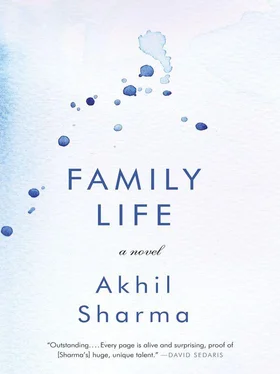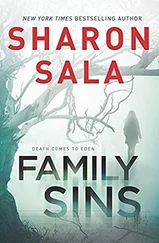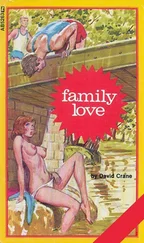“That’s how you think,” my father said, flaring up. “To you everybody is an enemy. If I smile, I have committed a sin.” It seemed obvious that my father felt caught and so was trying to distract from his mistake.
“If I weren’t willing to fight,” my mother shouted, “if I weren’t willing to scream, they would put Birju on the street. They would say it is time to go and here is your bill and there is the door. The only reason they haven’t forced Birju out is because they are frightened, because they don’t want to fight with someone who’s crazy.”
“Yes, you are crazy. I have always said you’re crazy.”
“And you’re a coward. You don’t want to do the hard things. You want to flatter and be nice and hope that these nurses and doctors will do everything Birju needs on their own. They won’t. They will do the ordinary things but not the hard things. For the hard things you have to fight. These doctors and nurses just want you to be silent. They don’t care what happens as long as you don’t cause trouble.”
My parents fought, and I was becoming lazy. Now when I came to the hospital after school, I no longer wanted to sit by Birju’s bed and sing prayers. Singing prayers bored me. Often when I got to his room, I would tell my mother that I had homework and would go to the children’s lounge down the hall.
The lounge had blue walls and yellow bookcases with picture books. There was a yellow beanbag and a large television. I liked to sit on the beanbag before the TV with a book in my lap and read while the TV played. Whenever commercials started, I would look down at the book and read. I liked books where the hero was a young man, preferably under twenty-five, who had a magical power that he discovered over the course of the book. Riddle of Stars, The Chronicles of Amber, A Wizard of Earthsea —I read these over and over. Reading a book a second time was more comforting than reading it the first because during the second reading everything was in its place. I read and watched TV so much that sometimes when I closed my eyes, images flickered before me.
I felt that there was something bad about being lost in my imagination. Occasionally, there were fall days that were so beautiful that I thought I would never see a day so lovely again. I would think this and then go back to reading or watching TV.
One evening when I was in the lounge, I saw a rock star being interviewed on Entertainment Tonight . The musician, dressed in a sleeveless undershirt that revealed a swarm of tattoos on his arms and shoulders, looked past the interviewer and began shouting at the camera. “Don’t watch me! Live your life! I’m not you.” I was filled with a sudden desire. I hurried out of the lounge and went down the hall and left the hospital. I stood outside the main entrance.
Now that I was outside, I didn’t know what to do. It was cold and dark and there was an enormous moon. Cars leaving the parking lot stopped one by one at the edge of the road. I watched as they waited for an opening in the traffic, their brake lights glowing.
“ARE THINGS GETTING worse?” I asked God. November had just begun. Soon it would be Thanksgiving and then Christmas, and after this there would be a new year and in that year there would not have been a single day in which Birju had walked or talked.
“What do you think?”
“They seem to be.”
“At least Birju’s hospital hasn’t forced him out.”
“At least Birju isn’t dead. At least Daddy’s bus has never fallen off a bridge.”
God was silent.
“I’m ashamed,” I said.
“About what?”
“That after the accident, I was glad I might become an only child.”
“Everybody thinks strange thoughts,” God said. “It doesn’t matter if you think something.”
“When I was walking around in the schoolyard and you asked if I would switch places with Birju, I thought, No .”
“That, too, is normal.”
“Why don’t you make Birju like he was?”
As soon as I asked the question, God stopped feeling real. I knew then that I was alone, lying under my blanket, my face exposed to the dark.
“Christ was my son. I loved Job. How long did Ram have to live in the forest?”
“What does that have to do with me?” Normally this was the time to start discussing my glorious future. But the idea of a future in which Birju was sick made fame seem pointless.
“I can’t tell you what the connection is, but you’ll be proud of yourself.”
I didn’t say anything. God and I were silent for a while.
“What are three minutes for you?” I asked. “Just get rid of the three minutes when Birju was at the bottom of the pool.”
“Presidents die in less time than that. Planes crash in less time than that.”
I opened my eyes. My mother was on her side, and she had a blanket pulled up to her neck. She looked like an ordinary woman, her face sagging, her mouth open. It surprised me that you couldn’t tell, just by looking at her, that she spent all day every day in a hospital, that she spent all day sitting by her son who was in a hospital bed, who was once going to go to the Bronx High School of Science but who was now so brain damaged that he could not walk or talk, could not turn over in his sleep, and had to be fed through a rubber tube that went into his side.
AND I KNEW things were getting worse. My parents fought with such anger that it was as if they hated each other.
One fall day, when all the trees had lost their leaves and the world looked like a fire had gone through it, my parents fought so bitterly in Birju’s room that my mother told my father to go home and take me with him. My father drove us away. The route back to my aunt’s took us along unpopulated two-lane roads. There were scrubby trees along the road, and between them I could see a lowering misty sun chasing us.
On one of the roads was a small bar with a gravel lot. The bar looked as if it had been a house once. Now it had a neon sign, an orange hand lifting a sudsy mug of beer. Instead of driving past, my father turned into the lot. I wondered why. I had never known anyone who drank. I had always assumed that people who drank were either Muslims or poets, or else rich and depraved.
The tires made a crunching sound as we rolled up toward the wooden steps of the little house. “One minute,” my father said, and reached past me and pushed open the door on my side.
Inside, the bar was dark and the air smelled of cigarette smoke and something stale and sweet. The floor was linoleum, like the kitchen at my aunt’s. A basketball game was playing on the TV.
My father spoke to the bartender, a big man in a sleeveless sweatshirt. “Is anything half off?”
“Well drinks.”
“I’ll have a double of your cheapest whiskey.”
My father lifted me onto a stool. I looked around. There was an old, fat man in shorts sitting at a table. He was wearing an undershirt, and his stomach sat in his lap like a small child. He was wearing sneakers and no socks and the skin around his ankles was black like a bruised banana.
The bartender returned with the drink. My father drank it in a gulp. It was the first glamorous thing I had ever seen him do. It was the act of a gangster or cowboy. Then he ordered another. The announcer raised his voice, and we looked at the TV. My father asked if I had ever seen a basketball game all the way through.
“I’ve seen the Harlem Globetrotters.”
“I’ve heard they don’t play other teams because they can defeat everyone else so easily.”
“They only play against each other or if the president asks, like when they had to play against aliens to save the earth.”
“Aliens?”
I realized that my father had been teasing me and I had confused TV with reality. My ears became hot.
Читать дальше












